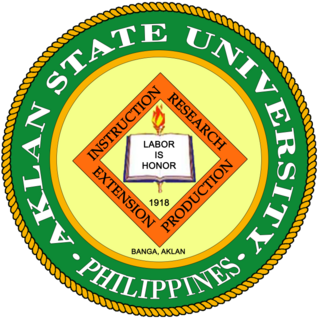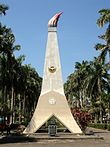
The United Nations Industrial Development Organization (UNIDO) is a specialized agency of the United Nations that assists countries in economic and industrial development. It is headquartered at the UN Office in Vienna, Austria, with a permanent presence in over 60 countries. As of April 2019, UNIDO comprises 170 member states, which together set the organization's policies, programs, and principles through the biannual General Conference.

Mercy Corps is a global non-governmental, humanitarian aid organization operating in transitional contexts that have undergone, or have been undergoing, various forms of economic, environmental, social and political instabilities. The organization claims to have assisted more than 220 million people survive humanitarian conflicts, seek improvements in livelihoods, and deliver durable development to their communities.

Catholic Relief Services (CRS) is the international humanitarian agency of the Catholic community in the United States. Founded in 1943 by the Bishops of the United States, the agency provides assistance to 130 million people in more than 110 countries and territories in Africa, Asia, Latin America, the Middle East and Eastern Europe.

The Technical Centre for Agricultural and Rural Cooperation ACP-EU (CTA) was established in 1983 under the Lomé Convention between the African, Caribbean and Pacific Group of States and EU member states. Since 2000 CTA has operated within the framework of the ACP-EU Cotonou Agreement with a mission to “strengthen policy and institutional capacity development and information and communication management capacities of ACP agricultural and rural development organisations. It assists such organisations in formulating and implementing policies and programmes to reduce poverty, promote sustainable food security, preserve the natural resource base and thus contribute to building self-reliance in ACP rural and agricultural development.”. The centre is closed in 2020, after the end of the Cotonou Agreement and the subsequent end of its financing.

Nicanor Jesús "Nick/Nicky" Pineda Perlas III is a Filipino activist and awardee of the Right Livelihood Award in 2003, which is often referred as an alternative Nobel Prize.

Aklan State University, ), also referred to by its acronym ASU, is a provincial state university in Aklan province, Philippines. Its seat of governance is in ASU - Banga, with four other campuses across the province. ASU focuses on agriculture, fishery, arts and sciences, engineering and technology, and education.

The Philippines' Agricultural Training Institute, is an agency of the Philippine government under the Department of Agriculture responsible for training agricultural extension workers and their clientele; conducting multi-level training programs to promote and accelerate rural development; and ensuring that research results are communicated to the farmers through appropriate training and extension activities.
The Global Forum on Agricultural Research and Innovation (GFAR) is an inclusive global forum, enabling all those concerned with the future of agriculture and its role in development around the world, to address key global needs. GFAR provides an open forum for stakeholders across the agricultural spectrum—ranging from researchers, organizations, and farmers—to participate in collaborative discussion and action around the current and future state of agriculture.
The Farmer-to-Farmer (F2F) Program is funded by the US Agency for International Development through the US Farm Bill to assist developing countries, middle-income countries, and emerging markets around the world to increase farm production and incomes. It promotes sustainable economic growth, food security and agricultural development worldwide. Volunteer technical assistance from US farmers, agribusinesses, cooperatives, and universities helps developing countries improve productivity, access new markets, build local capacity, combat climate change and conserve environmental and natural resources. Farmer-to-Farmer also aims to increase the American public's understanding of international development issues and programs and international understanding of the U.S. and U.S. development programs.

The Tarlac Agricultural University (TAU), formerly the Tarlac College of Agriculture, is a public university in the province of Tarlac, Philippines. It is mandated to provide professional, technical and instruction for special purposes and to promote research extension services and progressive leadership in agriculture, agricultural education, home technology and other related fields. Its main campus is located in Malacampa, Camiling, Tarlac.

The College of Public Affairs and Development (CPAf) is one of the colleges in University of the Philippines Los Baños. It offers graduate instruction, research and extension programs that center on the study of communities in transition and their institution such as resource access, governance, policy and education, inter alia, and the intrinsic interplay among the institutions. It can be found at the forestry area or the upper campus of the university. That is approximately a hundred meters from the entrance to the UPLB College of Forestry and Natural Resources.

The Central Philippine University Library is the library system of the Central Philippine University in Iloilo City, Philippines. Established in 1910, it is one of the largest academic and research libraries in the Philippines at present with more than 250,000 volumes or holdings it has, including special collections categorized into sections which include the 40,000+ United Nations Documents, American Studies Resource Center, Meyer-Asian Collection, Food and Agriculture Organization and Elizabeth Knox Sacred Music Collection. Rare collections of Second World War documents and Asian archaeological artifacts are also found in the collection of the main library.
The World Vegetable Center (WorldVeg), previously known as the Asian Vegetable Research and Development Center (AVRDC), is an international, nonprofit institute for vegetable research and development. It was founded in 1971 in Shanhua, southern Taiwan, by the Asian Development Bank, Taiwan, South Korea, Japan, the Philippines, Thailand, the United States and South Vietnam.

Arsenio Molina Balisacan is a Filipino economist and academician currently serving as the Secretary of the National Economic and Development Authority (NEDA). Balisacan first served as the NEDA Secretary from May 2012 to January 2016 under the Benigno Aquino III administration. He then served under the Duterte administration as the Chairperson of the Philippine Competition Commission from February 1, 2016 to June 30, 2022. He was again appointed as NEDA Secretary under the Bongbong Marcos administration. During his first term in 2012, he concurrently served as NEDA Secretary and as Chairman of the Boards of the Philippine Statistics Authority, Philippine Institute for Development Studies, Philippine Center for Economic Development, and Public-Private Partnership Center.
International Institute of Rural Reconstruction, also known as IIRR is a non-profit organization that helps empower rural communities by making them self-sufficient. By offering programs across health, education, environment, and livelihood, its goal is to have rural communities take charge of their own success. The organization has delivered programs to more than 40 countries in Asia, Africa, and Latin America and directly impacted the lives of over 19 million people as of 2019.
The Growth and Transformation Plan (GTP) was a national five-year plan created by the Ethiopian government to improve the country's economy by achieving a projected gross domestic product (GDP) growth of 11-15% per year from 2010 to 2015. The plan included details of the cost and specific targets the government expects to hit by pursuing the following objectives.
The Southeast Asia Ministers of Education Organization (SEAMEO) is an intergovernmental organization of the eleven Southeast Asian countries, which was formed on 30 November 1965 by the Kingdom of Laos, Malaysia, the Philippines, Singapore, Thailand and the then Republic of Vietnam. SEAMEO aims to promote regional cooperation in the fields of education, science and culture. The current SEAMEO Director is Dr. Ethel Agnes Pascua-Valenzuela of the Philippines.

The Sustainable Mekong Research Network (SUMERNET) is a network of organizations committed to the sustainable development of the Greater Mekong Region. Launched in 2005, SUMERNET supports policy-relevant research and outreach activities to inform and engage policy-makers, planners and stakeholders. Within this context, it pursues an evolving agenda in response to questions and policy issues that arise in the region. Current research themes are climate-compatible development, regional economic integration, and ecosystem services and local development. The network works on a range of issues including natural ecosystems governance, floods and natural disasters, climate change and adaptation, and transboundary resource flows.

The SEAMEO Regional Centre for Archaeology and Fine Arts or SPAFA is a Southeast Asian inter-governmental collaboration centre on cultural heritage research and conservation, part of the Southeast Asian Ministers of Education Organization (SEAMEO). The centre was established in 1985. It is hosted by the Government of Thailand. The main objective of the Centre is to promote professional competence, awareness, and preservation of cultural heritage in the fields of archaeology and fine arts in Southeast Asia.
This article summarizes the development of science and technology in Cambodia from a policy perspective.














